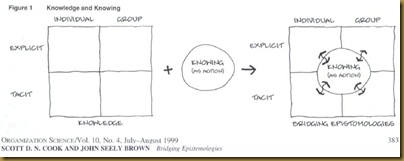I am reading what is turning out to be a more interesting article than I thought from its somewhat misleading title:
Cook, S. D. N., & Brown, J. S. (1999). Bridging epistemologies: The generative dance between organizational knowledge and organizational knowing. Organization Science, 10(4), 381-400.
I am now struggling to understand their model of knowledge and knowing:

This came up in my dissertation research (instrumental case study on an existing community of practice) and I presented it as a finding: within the community, there was a difference between knowing how to do things (‘knowledge’) and knowing ‘how to get things done’ (practice, experience, application’). “How to get things done” was often generated via interaction with others in and around the community, essentially, the transfer of tacit knowledge among members. The illustration you show makes sense to me and I wish I’d had it a year ago!
I blogged about this at http://bozarthzone.blogspot.com/2008/12/how-to-do-things-v-how-to-get-things.html late last year if you’d like to take a look.
Best,
JB
@Jane Bozarth
Interesting research; thank you for sharing it and for your link.
What did you learn through your dissertation about CoP?
Jeffrey
I was applying Wenger’s work to another community. Findings included how to do things v. how to get things done; that orgs in seeking to ‘harness’ info may lose important tacit information; that tacit info is often shared via meaningful interaction with other practitioners, not by storing in a database.
Discussion included suggestion that orgs would better view CoPs as places for exemplary performers to engage with one another rather than a vehicle for capturing data for org to use. Also that practioners do not necessarily see their knowledge as something the org ‘owns’, but as something to share freely for the common good. Overall recommendation was that CoPs need to be nurtured, not managed.
It’s at http://www.lib.ncsu.edu/theses/available/etd-11042008-150721/unrestricted/etd.pdf if you want to take a look.